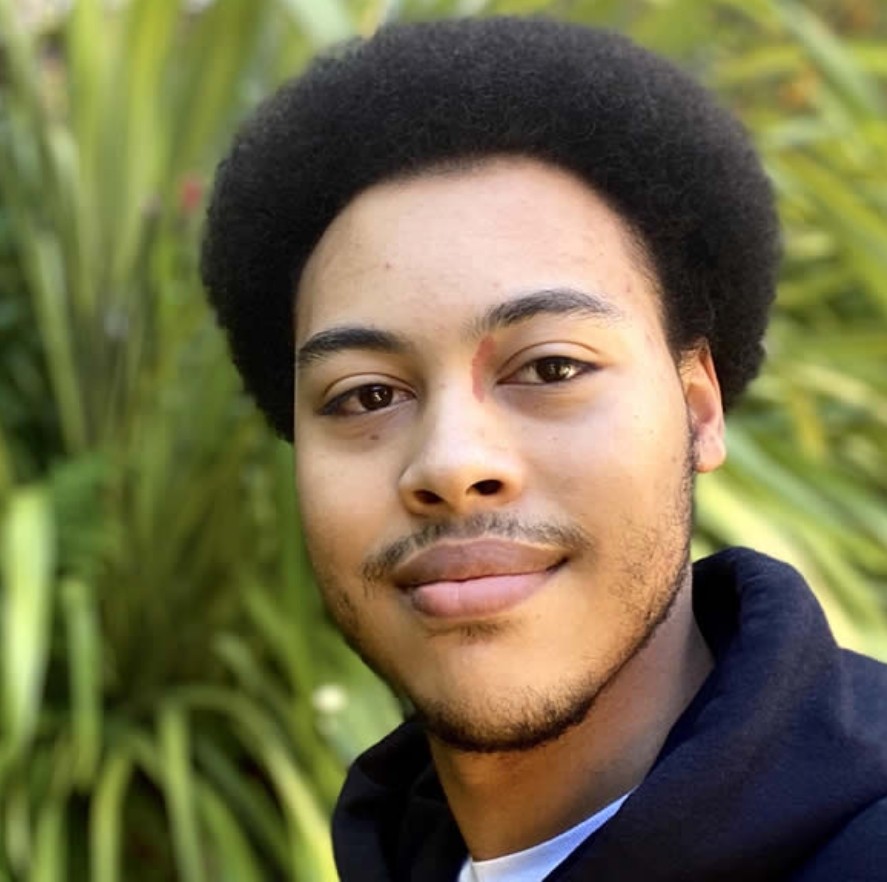During high school, Amani Maina-Kilaas ’23 won an award for helping his peers. Creating those partnerships with fellow students was something he wanted to continue in college, and a campus visit showed him Mudd was the perfect place to do just that.
Today, the computer science and math major helps his classmates by grutoring (grading and tutoring) in a couple of his favorite classes, teaching students how to free skate and collaborating on research projects in Professor George Montañez’s AMISTAD lab. (AMISTAD stands for Artificial Machine Intelligence = Search Targets Awaiting Discovery, but it also translates to “friendship” in Spanish, which proves the lab is a perfect fit for Maina-Kilaas.) In January, he won the Computing Research Association’s 2022 Outstanding Undergraduate Researcher Award for the work he completed in the lab as a rising sophomore.
“When I came here, I knew I wanted to experience everything, from internships to research,” says Maina-Kilaas. “At other schools, you might need to be in your senior year to do those things. But opportunities at Mudd are far more accessible.”
What drew you to math and computer science?
I fell in love with math in high school. I liked the problem-solving aspect, and I would get caught up in trying to figure out all the extra credit problems on my homework assignments. When I came to a solution, I had a sense of satisfaction. Because my dad is into computers, I’d been exposed to CS a little bit, and I found that same satisfaction. I thought, “This kind of fun is what I want to have in a job.”
Describe your work in the AMISTAD lab that led to the CRA award.
We investigated how the ability to perceive intention can advantage virtual agents. We created simulations to study intention perception directly through a multi-agent, prey-predator encounter and a two-player, game-theoretic adversarial situation and also indirectly through having agents analyze artifacts left behind by another. That summer resulted in three publications, two for which I was lead author and one for which I was co-lead author.
What does the Outstanding Undergraduate Researcher Award mean to you?
The first thing I did was tell Prof. George that he must have written a great recommendation letter. Then I looked up the other people who won the award and thought, “Wow, they’re impressive. Are we sure I should have won?” But now that the excitement has worn off, this award is a sort of validation. I guess I am a researcher, and maybe the work I’ve done is kind of cool. It’s nice to have that recognized outside of the small group I work with.
Tell us about running Mudd’s Skate Society.
My freshman year, the previous president got very busy. And then COVID happened. There were very few freeskaters on campus when we came back this year, and we want a lot of freeskaters—it’s sort of our brand. The previous club president told me I should take it up, so, together with a few friends, we restarted the club. The first few weeks of the fall semester, I was teaching 10-20 people a day how to ride, and we placed a bulk order for almost 40 skates.
In October, I broke my leg freeskating. I wasn’t doing any fancy tricks or anything, but there’s this one area on campus that’s known for wiping people out. I was one of those people. On the bright side, I am now freeskating again.
Do you have plans for after graduation?
I’m very indecisive, and I’ve been struggling with the post-grad question for a long time. Everything appeals to me: I like the idea of going into the industry, but I also like the idea of pursuing a PhD and then either becoming a professor or doing research. But I’ve recently decided my desire to learn more outweighs the potential opportunity cost, and I think earning a PhD would be really fun and valuable no matter what I do afterwards. So I’m planning to apply for programs. I’m still trying to figure out what area of CS I’d want to pursue, and I’m hoping this semester and this summer will help me narrow that down.
